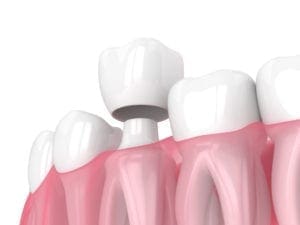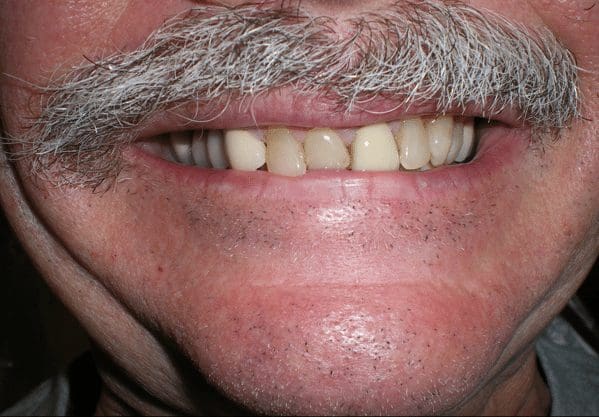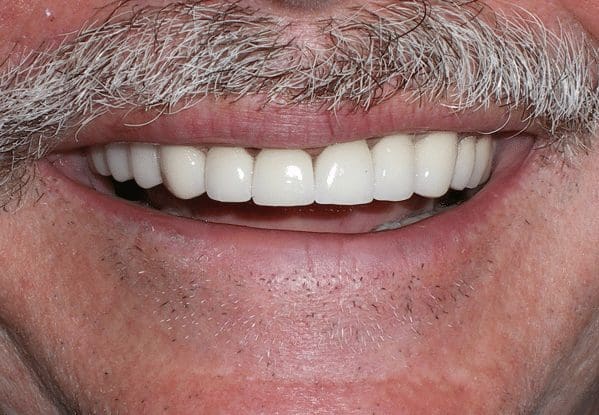Your smile is a big part of your appearance, and a cosmetic dental crown can make a huge difference in how you feel about your teeth. We make our crowns with high-quality materials that can fix both cosmetic and oral health issues. At our cosmetic dental office in Plano, TX, we offer crowns to help with many dental issues.
A dental crown is a tooth-shaped cap that can consist of materials like porcelain or zirconia. It fits over what’s left of your tooth to protect and restore it. Dr. Grapevine often suggests a crown after a root canal to keep your tooth strong and prevent future problems. Modern crowns look like natural teeth, and they come in different colors to match your smile.
Dr. Grapevine will guide you in choosing the best type of crown for your needs. In most cases, he recommends porcelain crowns because they are strong and last a long time.
Patient Review
What Do Dental Crowns Treat?
Crowns can help fix many cosmetic and health issues. They cover the whole tooth, making them useful for fixing both the look and function of your teeth. While professional teeth whitening can help with most stains, some teeth don’t respond well to it. In these cases, the dentist can color-match a crown to the shade of white you want.
Crowns also strengthen teeth after procedures like root canals. During a root canal, the dentist removes infected tissue and seals the tooth, but sometimes the tooth needs extra protection. A crown helps protect it from more decay and restores its function.
Crowns can also fix damaged teeth or teeth that have been through trauma. They can save a tooth that the dentist might otherwise need to remove.
 Misshapen or broken teeth can affect how you chew, speak, or even smile. A crown can fix these issues by covering the tooth and restoring its normal shape and function. For dental implants, crowns are the finishing touch. They are custom-made to look and feel like real teeth, making them the best option for replacing missing teeth.
Misshapen or broken teeth can affect how you chew, speak, or even smile. A crown can fix these issues by covering the tooth and restoring its normal shape and function. For dental implants, crowns are the finishing touch. They are custom-made to look and feel like real teeth, making them the best option for replacing missing teeth.
Dental Crowns Procedure
Dr. Grapevine will first fit you for a crown by trying out different colors of dental cement to ensure the crown matches your natural teeth. While the lab makes your permanent crown, you’ll wear a temporary one made of tooth-colored plastic. In some cases, Dr. Grapevine may use a “flipper,” which is a type of false tooth, instead of a temporary crown.
After about two weeks, your permanent crown will be ready. Before attaching it, Dr. Grapevine will stabilize your tooth by adding a filling. Then, he will cement the permanent crown onto the tooth.
Dental crowns are sometimes called “caps” because they cover the whole tooth. Porcelain crowns look very natural since they are made in thin layers that reflect light like natural teeth do.
Steps for Getting a Dental Crown:
- Consultation & Evaluation: Dr. Grapevine will first meet with you to examine your teeth and gums. He’ll create a treatment plan to address any health concerns and help you reach your cosmetic goals.
- Preparation: The dentist will prepare your tooth by removing old fillings and creating a strong base for the crown. He’ll also take an impression of your tooth and choose the best color to match your other teeth.
- Temporary Crown: While the lab is making your permanent crown, you’ll wear a temporary crown to protect your tooth.
- Final Fit & Cementation: Once the permanent crown is ready, you’ll try it on to make sure the fit, shape, and color are right. After making any small adjustments, Dr. Grapevine will bond the crown to your tooth, completing the process.
Dental Crown Aftercare
After getting a dental crown, we numb the area with a local anesthetic. Don’t eat until the numbness goes away so you don’t accidentally bite your tongue or cheek. For the first few days, avoid hard or sticky foods since they can loosen the crown. Try to chew on the other side of your mouth during this time.
It usually takes a few days to fully recover from the crown procedure. You may feel some soreness, swelling, and sensitivity. You can manage this with over-the-counter pain medicine and warm salt water rinses to reduce swelling and speed up healing. If you’re still in pain after a week or two, give us a call. We may need to adjust the crown.
With the right care, dental crowns can last a long time. This means brushing twice a day, flossing daily, and visiting the dentist every six months. Even though the crown covers your tooth, bacteria and food can still get under the crown and cause problems. If your natural tooth gets damaged, the crown may not fit right anymore.
When choosing oral health products, use a toothbrush with soft bristles. Even medium-bristle brushes can scratch your crown. Stay away from toothpaste with abrasive ingredients like activated charcoal, which can also harm the crown.
Dr. Grapevine achieves natural-looking results that will last a lifetime.

Before dental crowns

After dental crowns
See more dental crown before and after photos in our Smile Gallery.
Dental Crown FAQs
How long will my tooth crown last?
Crowns usually last between 10 to 15 years. With good care and regular dental visits, they can last even longer. If your crown causes pain or discomfort, it may be time for a new one.
Can a dentist whiten a dental crown?
No, you can’t whiten crowns with regular teeth whitening treatments. However, you can prevent stains by rinsing your mouth with a mix of baking soda and saltwater twice a week. Cutting back on coffee, soda, and tobacco can also help.
Do I always need a dental crown after a root canal?
Most of the time, yes. A crown is usually placed after a root canal to strengthen the tooth and protect it from further damage. Without a crown, the tooth can become more sensitive and prone to decay or fractures.
Can dental crowns fall off?
Yes, a dental crown can fall off, but it doesn’t happen often. This can be because of tooth decay, the crown not being placed right, or the adhesive failing. Taking care of your teeth and visiting the dentist regularly keeps your crown in place. If your crown does fall off, contact your dentist right away to have it reattached or replaced to avoid more problems.
Can I get a dental crown if I grind my teeth?
Yes, you can still get dental crowns if you grind your teeth. Crowns can protect your teeth from damage caused by grinding. It’s important to choose a strong material like porcelain-fused-to-metal or zirconia, which can handle the pressure from grinding. Regular check-ups help the dentist make sure your crowns and teeth stay in good shape.
Can a dental crown replace a lost tooth?
A crown alone can’t replace a missing tooth, but it can be part of a bigger treatment plan. For example, dental implants and bridge procedures use crowns, which can replace missing teeth. In an implant procedure, the dentist places a titanium post in your jaw and secures a crown on top.
With a bridge, the crown attaches to nearby teeth to hold the false tooth in place. Your dentist will help you decide the best option for replacing a tooth.
Schedule a Dental Exam Today
Visit our office in Plano, TX, for expert dental care with Dr. Jacob Grapevine. We are your top source for prosthodontics and proudly serve Plano, Frisco, Dallas, and nearby areas. Call us at (972) 449-5759 or request a dental exam online. We look forward to seeing you!
